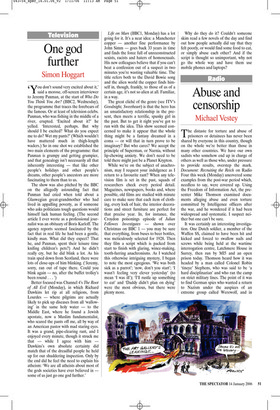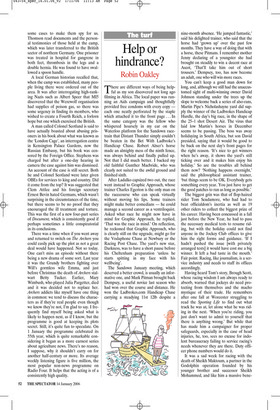Radio
Abuse and censorship
Michael Vestey
The distaste for torture and abuse of prisoners or detainees has never been shared by everyone in this country, though on the whole we’re better than those in many other countries. We have our own sadists who somehow end up in charge of others as well as those who, under pressure to provide results, overstep the mark. Document: Recruiting the Reich on Radio Four this week (Monday) uncovered some examples from the post-war period which, needless to say, were covered up. Using the Freedom of Information Act, the presenter Mike Thomson examined documents alleging abuse and even torture committed by Intelligence officers after the war, and he wondered if it had been widespread and systematic. I suspect neither but one can’t be sure.
It was certainly an interesting investigation. One Dutch soldier, a member of the Waffen SS, claimed to have been hit and kicked and forced to swallow nails and screws while being held at the wartime interrogation centre, Latchmere House in Surrey, then run by MI5 and an open prison today. Thomson heard how it was headed by a man called Colonel Robin ‘tineye’ Stephens, who was said to be ‘a hard disciplinarian’ and who ran the camp on strict military lines. The point of it was to find German spies who wanted a return to Nazism under the auspices of an extreme group called Werewolf, and in some cases to make them spy for us. Thomson read documents and the personal testimonies of those held at the camp, which was later transferred to the British sector of northern Germany. One prisoner was treated in hospital for gangrene in both feet, thrombosis in the legs and a double hernia. He was found to have swallowed a spoon handle.
A local German historian recalled that, when the camp was established, many people living there were ordered out of the area. It was after interrogating high-ranking Nazis such as Albert Speer that MI5 discovered that the Werewolf organisation had supplies of poison gas, so there was some urgency in finding its members, who wished to create a Fourth Reich, a forlorn hope but one which exercised the British.
A man called Colonel Scotland is said to have actually boasted about abusing prisoners in his book about what was known as the ‘London Cage’, an interrogation centre in Kensington Palace Gardens, now the Russian Embassy, but his book was censored by the Foreign Office. Stephens was charged but after a one-day hearing in camera the case against him was dismissed. An account of the case is still secret. Both he and Colonel Scotland were later given OBEs for services to king and country. Did it come from the top? It was suggested that Clem Attlee and his foreign secretary Ernest Bevin hated Germans, which wasn’t surprising in the circumstances of the time, but there seems to be no proof that they encouraged the ill treatment and torture. This was the first of a new four-part series of Document, which is consistently good if perhaps sometimes a little conspiratorial in its conclusions.
There was a time when if you went away and returned to switch on The Archers you could easily pick up the plot as not a great deal would have happened. Not so today. One can’t miss an episode without there being a new drama of some sort. Last year it was the Grundy brothers fighting over Will’s gormless wife Emma, and just before Christmas the death of Archers stalwart Betty Tucker. Earlier, Mary Wimbush, who played Julia Pargetter, died and it was decided not to replace her. Archers addicts like myself have one thing in common: we tend to discuss the characters as if they’re real people even though we know they’re not, I’m glad to say. I frequently find myself being asked what is likely to happen next, as if I know, but the programme is good at keeping its plots secret. Still, it’s quite fun to speculate. On 1 January the programme celebrated its 55th year, which is quite remarkable considering it began as a more earnest series about agriculture news. There’s no reason, I suppose, why it shouldn’t carry on for another half-century or more. Its average weekly listening figure is five million, the most popular non-news programme on Radio Four. It helps that the acting is of a consistently high quality.















































 Previous page
Previous page